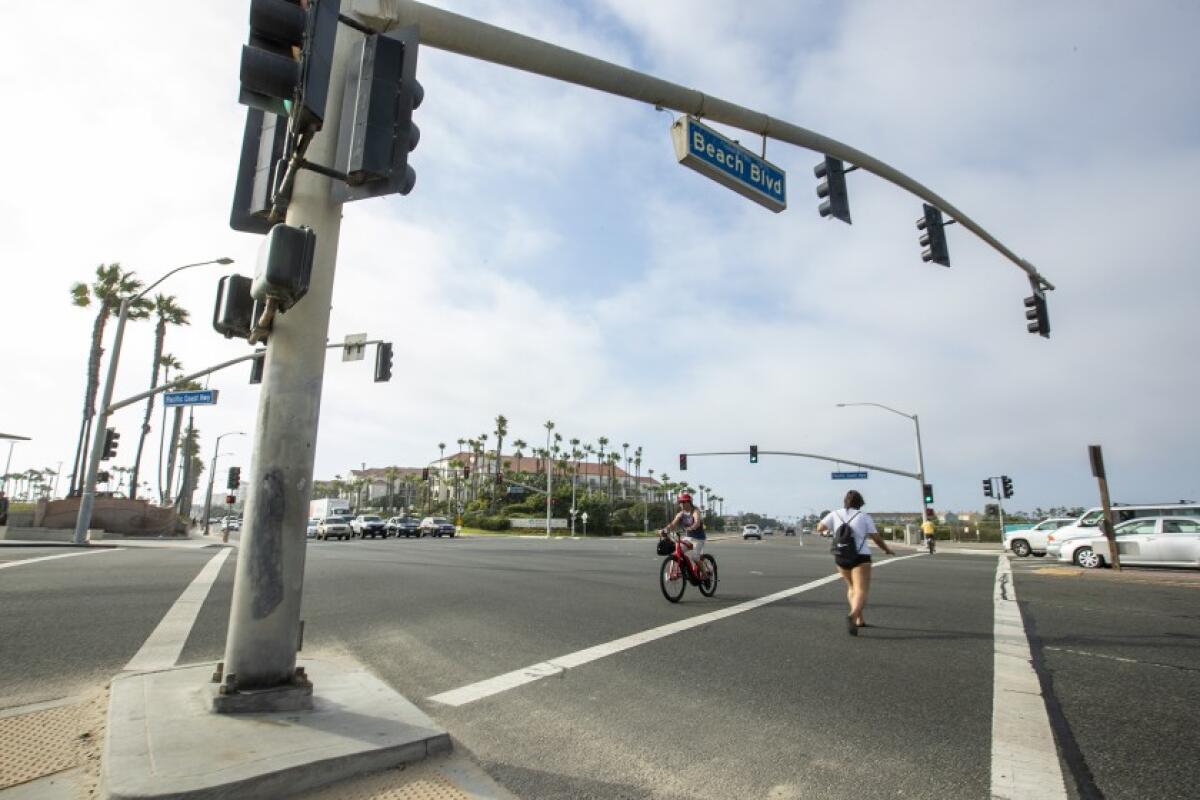Planning Commission vote moves Huntington Beach a step closer to resolving state housing lawsuit

- Share via
Huntington Beach and state officials are a step closer to resolving a dispute over the city’s housing plans and paving the way for the city to be in compliance with state law and eligible for funds to address homelessness.
The city Planning Commission voted 6-1 on Tuesday night to approve amendments to the Beach and Edinger Corridors Specific Plan that would include establishing sites for potential development of affordable housing.
In a letter to the city Friday, state housing officials said the proposal, if the City Council approves it by March, would meet the terms of a state law that requires all communities to zone for enough affordable housing to meet projected population growth. That would resolve the central issue in a 2019 state lawsuit over what the state says is the city’s failure to plan for more affordable housing. It is one of several ongoing housing-related lawsuits involving Huntington Beach and the state.
A significant proposed amendment to the city’s Beach and Edinger Corridors Specific Plan would establish an “affordable housing overlay.” Planning commissioners Tuesday will consider recommending that the City Council adopt the 2013-21 general plan housing element and pursue certification from the state.
The commission recommended that the council adopt the amended general plan housing element for 2013-21 and pursue certification from the California Department of Housing and Community Development.
Many commissioners reluctantly accepted the latest version of the housing element while expressing relief that the process is moving forward.
However, Commissioner Pat Garcia, who cast the dissenting vote, said: “I have a big problem with California coming in and telling us what to do. ... Why are we even here? If they’re going to run everything, what do they need us for?”
Garcia also took issue with parking congestion that he said is “creating problems all over the city.”
Garcia, who works in the area of Beach Boulevard and Edinger Avenue, said “Edinger was already a zoo up there and now it’s even worse.”
The city proposed changing the Beach and Edinger specific plan to establish an “affordable housing overlay” covering seven sites, predominantly along Beach Boulevard. In all, those sites encompass almost 11 acres and would provide “potential development of 607 multifamily units,” according to a staff report.
The state’s letter said one of those sites is owned by the California Department of Transportation and not listed as surplus or excess property and is therefore not available for development.
Even without that, though, the city can meet its shortfall of 413 lower-income units determined by the state, the letter said.
According to Jennifer Villasenor, city deputy director of community development, the sites are either vacant or underutilized and are “all very representative of sites that have already been developed in the specific plan.”
“We are looking at a very small percentage of zoning increase only,” Commissioner Dan Kalmick said.
Commission Vice Chairman Alan Ray said he would “reluctantly” support the plan “because I feel the pros outweigh the cons.”
“Certainly one of the cons to approving it would be, in my view, ceding some local control to the state. And normally that would be something that I’m against,” Ray said. On the flip side, he said being in compliance with state law and benefiting from state funds for homeless services would make the approval worthwhile.
To be eligible for that funding, which is made available through the Building Homes and Jobs Act of 2017, or Senate Bill 2, the city must have a certified general plan housing element. Huntington Beach missed out on up to $625,000 in funds for affordable housing in 2019. Going forward, it would be eligible for $481,000 per year from SB 2 funds.
Community members associated with a group called Homeless United spoke in support of the proposal at Tuesday’s public hearing.
“The Irish in me hates to back away from the good fight,” Commissioner Connie Mandic said. ”But I think ... the time has come to settle some of the issues with the state. Some of the reasons are the mounting city costs in time and money, lost revenue from state sources, a good choice of appropriate sites acceptable to the public, keeping key points regarding height of setbacks from the previous amendment and the relief of anxiety for residents regarding the location of low-income housing.”
The city’s 2013-21 housing element was certified in October 2013, but the state de-certified it after the city made amendments to the Beach and Edinger plan in May 2015. Those changes reduced the cap on new residential development from 4,500 units to 2,100 and imposed stricter height and setback requirements.
The amendments meant the city no longer had enough land zoned to accommodate low-income residents under state requirements.
“The current amendments, I think, are well-thought-out,” Mandic said.
All the latest on Orange County from Orange County.
Get our free TimesOC newsletter.
You may occasionally receive promotional content from the Daily Pilot.





